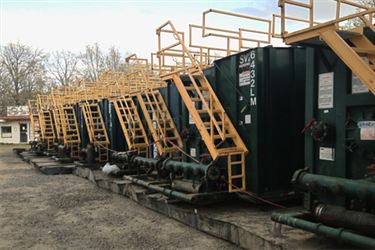Wyoming Imposed Fracking Rules Without Deciding How To Enforce Them
By Sara Jerome

New groundwater rules went into effect in Wyoming recently amid criticism from oil and gas companies.
The rules are among the strongest in the country for testing groundwater near fracking sites, according to the New York Times.
Under the new rules, energy companies "must take three groundwater samples within a half mile of new oil and gas wells, one before and two after the well is drilled," according to the Casper Star-Tribune.
But a big issue is still unresolved, the Tribune reported: "What will regulators do if a test shows that an aquifer has been polluted by an energy company?"
The rule does not include a definition of how the state will penalize a company that is responsible for contaminating a well.
Here's what would probably happen if contamination were discovered: "Though not required, regulators would likely call for subsequent rounds of testing and look at examining other water sources in the surrounding area to confirm the contamination," the Tribune said, citing experts.
State regulators would likely choose to investigate the matter, the report said. They could "propose a remedy if one were needed," the report said.
Wyoming has already seen some negative consequences due to fracking.
"Contaminated water from wells in the Pavillion area in western Wyoming apparently was linked to gas drilling in a study conducted by the EPA. It released a draft report in December 2011," according to a staff editorial in the Wyoming Tribune Eagle.
Will the new rules prevent future situations like the Pavilion incident? That's unclear, according to environmentalists.
"The way the rule is written now, yeah, they’re going to get some data, but it is going to be so complicated,” Jill Morrison, an organizer at the Powder River Basin Resource Council, an environmental group, said in the Tribune.
The Wyoming rules are significant because other states may look at them as a model for how to oversee the fracking industry.
"The two largest oil-drilling states, Texas and North Dakota, do not have water-testing requirements. Colorado and Ohio have some requirements, and several states encourage drillers to conduct tests. Jon Goldstein of the Environmental Defense Fund said that Wyoming’s was the strongest water-testing rule yet," the Times said. “It’s kind of a model for the country,” he said.
For more on government oversight, check out Water Online's Regulations & Legislation Solution Center.
Image credit: "Fracking Waste Containers," © 2010 Tar Sands Blockage, used under an Attribution 2.0 Generic license: http://creativecommons.org/licenses/by/2.0/deed.en
Copyright © 1996-2014 VertMarkets, Inc. All Rights Reserved.